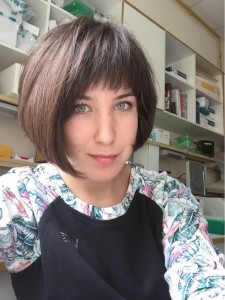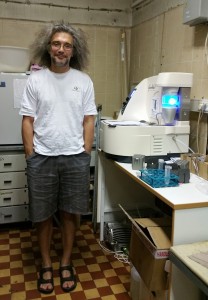Professor Konstantin Severinov, director of Skoltech Center for Data-Intensive Biomedicine and Biotechnology, has spent the late 1980’s in Bristol, UK, working on his Master’s thesis. Ever since, it’s his favorite place, filled with nostalgia. This summer, he had a chance to close a circle, when a young student came from Bristol to his lab, to work on her summer project.
Vera Vasilyeva is a Muscovite who is about to enter her last year of study for Bachelors in Pharmacology at the University of Bristol. We asked her to tell how she got to Severinov’s lab.
Vasilyeva: “Summer research projects are very common among UK students, as it allows gaining laboratory skills, which are essential for PhD studies. However, it is tricky for international students to get a scholarship funding for summer project and professors don’t allow students to volunteer. Thus, I have decided to apply for one in Russia. Professor Konstantin Severinov is a very well-known scientist, and I was lucky to do a voluntary placement in his lab”.
What were your expectations prior to the course?
“I expected to get familiar with common experimental techniques and more importantly, learn to work in the laboratory on my own. I would say that Skoltech teaching lab at the RAS Institute of Gene Biology is a great place to learn with modernly equipped facilities. The research in the lab that I participated in is focused on studying the structure and action of microcins, natural polypeptide antibiotics produced by some bacteria”.
What did you do during the course?
“My project was devoted to a study of predicted microcin from bacterium Thalassomonas actiniarum. We do not grow this bacterium in the lab, so I had to clone microcin genes. This included DNA isolation, getting microcin genes, cloning them into a plasmid vector, and then introducing them into Escherichia coli, a bacterium we know how to grow very well. I next performed expression and purification of Thalassomonas actiniarum microcin that was produced by bacterium I created. I have also had a chance to work with various computer tools to facilitate my experimental work”.
What do you think about the lecturers and your fellow students?
“My supervisor, Svetlana Dubiley, was very helpful and spent a lot of time with me explaining experimental protocols and guiding me through the project. Generally, the atmosphere in the lab was very friendly. The staff in the lab are overwhelmingly young people ranging from undergrads to PhD students and postdocs and all of them are ready to share their experience.
To summarize, I am really satisfied with my summer project and I feel that I’ve learnt a lot during these 7 weeks. I think that I received the same quality of teaching as I would’ve get in any UK University”.
Any thoughts of getting back to Skoltech as a Master’s student?
“Unfortunately, I am unsure about Master’s program for now”.
Prof. Severinov was pretty impressed by the young student: “Vera turned out to be an exceptional student. Her research was on a new antibiotic we predicted by bioinformatics means, and she made great progress validating the prediction considering that she had to start from learning the most basic things. I hope to see her again in the lab”.
Why do you think she chose your lab?
I am doing lots of outreach and this increases our visibility. Besides, we do good science and have many young people on the lab, so it is a very fun place to be in.
Do we encourage more bachelor students to take part in this and similar courses?
Yes, I think so. In addition to serving the common good, this is a very rational practice as it allows us to attract diverse people to Skoltech Master’s program and these people will be thoroughly “tested” in the lab during their internships. When they go back to their home institutions, one hopes they will spread the word about Skoltech (in fact we know this is happening and we see a steady increase in numbers of applications to our Biotech program as a result of this grapevine). Right now, we have four bachelor students form Far Eastern State Federal University in Vladivostok working with Professor Georgii Bazykin and in my lab. The students are great and they get a unique experience, working hard in the lab on important research projects.


